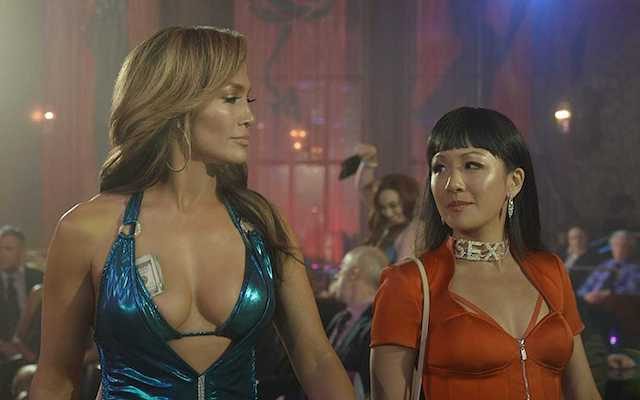
Jennifer Lopez, who turned 50 years old six weeks before “Hustlers” was released, enters the film on a stripper pole, flawlessly executing (without a body double) an astonishingly sexy routine before dismounting, writhing in a sea of dollar bills, and leaving the stage while remarking to an observer, “Doesn’t money make you horny?”
As a whole, this fact-based film, written and directed by Lorene Scafaria (“The Meddler”), isn’t as flashy or campy as that instantly iconic introduction suggests — it’s more “Goodfellas” than “Showgirls” — but it is a highly entertaining account of some of the desperate measures taken after the 2008 financial collapse (the crisis that keeps on giving in terms of movie plots). J-Lo plays Ramona, a veteran stripper and dancer who takes awestruck newcomer Dorothy (Constance Wu) under her wing at the upscale Manhattan gentlemen’s club that employs them. Things are great for a while; the sisterhood among the dancers is lively (Cardi B and Lizzo have cameos); everyone is happy.
Business dries up after the crash as Wall Street bros no longer have the means to drop several thousand dollars a night at strip joints, but Ramona has an idea that would make Henry Ford proud with its efficiency. Under the traditional system, men come to the club and the women encourage them to get drunk and pay for private dances (and tips). Ramona’s idea is to pick up men in bars, dose them with a mix of MDMA (so they’ll have a good time) and ketamine (so they’ll forget everything the next day), then take them to the strip club and drain their credit cards entirely. It’s so much easier this way. Rather than hope the guy will drink enough, then wait for him to do it, you jump right to the part where he’s wasted and making poor decisions.
What Ramona and Dorothy are doing is wrong, of course, not to mention dangerous, and Dorothy expresses concern. She insists they stick to men who are known drinkers and partiers, the kind who’d be likely to end up at a strip club anyway. They don’t want to ruin anyone’s life who’s not on his way toward ruining it himself. And after all, these are Wall Street creeps, the reckless pigs who destroyed the economy and didn’t get in any trouble for it. Serves ’em right!
The justifications are weak, but Scafaria is even less interested in chastising the ladies than the legal system was. What she wants to explore is the idea of women taking control of their own destiny (Destiny is Dorothy’s stage name), of women working together instead of against each other, and of marginalized people using what little power they have to achieve something like “justice.” The indignities of working at even a classy strip club (like the drunk dudes calling Dorothy “Lucy Liu”) are established so well that by the time Ramona unveils her plan, we’re more than happy to go along with it, or at least to watch semi-approvingly from the sidelines.
Constance Wu, introduced to movie audiences as the star of last summer’s hit “Crazy Rich Asians,” shows tremendous range here, as convincing when she’s “on the job” as when she’s giving a buttoned-down interview to a reporter (Julia Stiles) after the fact. It’s easy to see how Dorothy could fall under the spell of Ramona, who’s played with more commitment, passion, and a sense of fun than J-Lo has brought to any other role this century. The two bring in more strippers to help with the grift (played by Lili Reinhart and Keke Palmer), but it’s Wu and J-Lo’s film, enlivened by Scafaria’s dynamic directorial energy. I’ve never been prouder of my sisters/happier I don’t go to strip clubs.
B+ (1 hr., 50 min.; )





